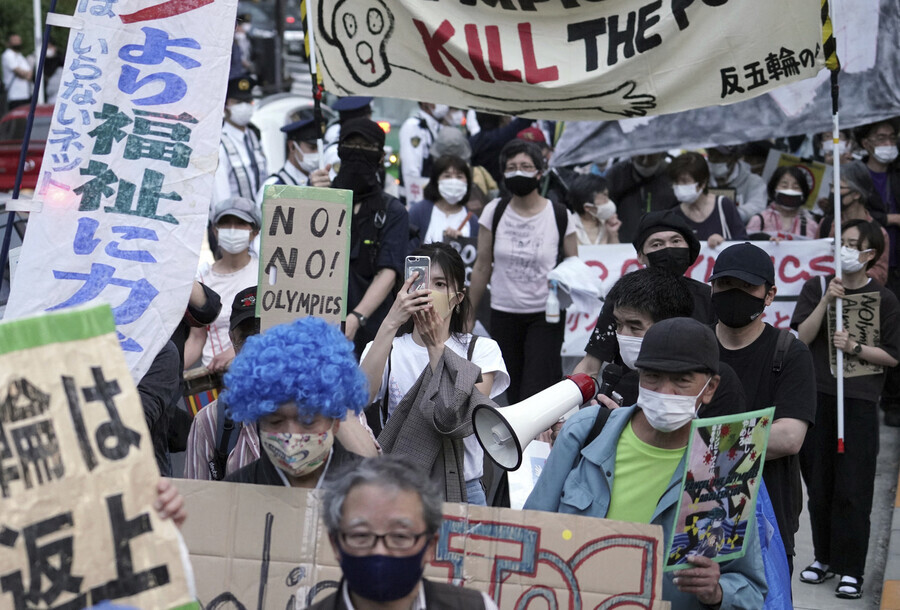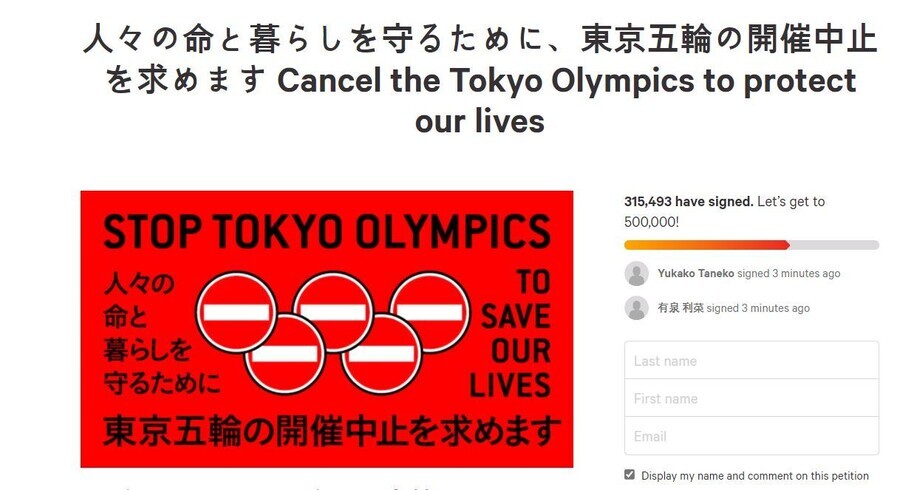hankyoreh
Links to other country sites 다른 나라 사이트 링크
Opposition to Tokyo Olympics peaks with 59% of Japanese wanting it canceled

With 70 or so days remaining until the Tokyo Olympics, a survey has found that approximately 60% of Japanese citizens believe the event should be canceled.
As public sentiment within the country continues to deteriorate amid petitions and protests calling for the Olympics to be called off, International Olympic Committee (IOC) President Thomas Bach’s scheduled visit to Japan in mid-May has reportedly been canceled.
After conducting a survey from Friday to Sunday on 1,092 respondents, the Yomiuri Shimbun reported Monday that 59% of respondents believed the Tokyo Olympics should be canceled. Even among those who thought the event should go ahead, many stated that the Olympics should be held entirely ‘without spectators.’
Twenty-three percent of respondents believed that both domestic and foreign spectators should not be allowed, a higher figure than the 16% who said spectators should be permitted to a certain degree.
The survey did not ask whether the Olympics should be postponed.

The COVID-19 pandemic has largely influenced negative public sentiment about the Olympics. Complaints about the country’s containment policies have reached a fever pitch, including the slow vaccine rollout and extension to the third state of emergency declared by the government.
In the survey, 68% responded that the government’s COVID-19 response was problematic. Only 23% took a favorable view, a 12 percentage point drop over last month and the lowest figure since the survey was first conducted in February last year. On Saturday, Japan’s daily number of new cases hit a four-month high of 7,192, with 6,488 recorded on Sunday.
Movements demanding the cancellation of the Olympics are also picking up steam.
Kenji Utsunomiya, former chair of the Japan Federation of Bar Associations, launched an online petition Wednesday calling for the Olympics to be canceled. The petition gained 310,000 signatures in just five days.
On Sunday, 100 or so citizens gathered for a protest near Japan National Stadium in Tokyo. At this venue, a test event for the Olympic track and field disciplines is currently being held.
The crowd chanted slogans, including “Save lives over the Olympics.” The demonstrators were angry that while the number of COVID-19 deaths continues to rise, the government seems preoccupied with providing special treatment to Olympic officials in testing, vaccines and immigration.
Another protest was set to be held on May 17, the date of Bach’s scheduled arrival in Japan. However, it is believed that Bach’s visit has been pushed back to June. The Mainichi Shimbun reported the visit “has been postponed because of differences with public sentiment.”
The newspaper quoted an official from the Tokyo Organising Committee of the Olympic Games who stated, “In light of the extension to the state of emergency, Bach’s visit to Japan would lead to great public backlash” and “it is unprecedented for the [IOC] president to be unable to visit [the host country] with less than 80 days left before the opening ceremony.”
Analysts believe costs and political fallout are the reasons the IOC and Japanese government refuse to give up on the Olympics even in the face of icy public sentiment.
Around 70% of the IOC’s revenue comes from broadcasting rights, so canceling the event would lead to a heavy financial blow, even with insurance coverage. The Mainichi Shimbun reported that Japan has invested close to 1.644 trillion yen (US$15.1 billion) in the Olympics, with the majority amounting to sunk costs in the form of stadium construction and labor expenses.
Furthermore, with the upcoming general election for the prime minister and House of Representatives this year, the consensus is that the political fallout for Prime Minister Yoshihide Suga would be immense if the Olympics had to be canceled due to his poor handling of COVID-19.
“We will do everything we can to protect the health and lives of the people while ensuring the Tokyo Olympics are held in a safe and secure manner,” Suga stated in a House of Representatives budget committee meeting on Monday. “This is my duty.”
By Kim So-youn, staff reporter
Please direct comments or questions to [english@hani.co.kr]

Editorial・opinion
![[Editorial] Penalties for airing allegations against Korea’s first lady endanger free press [Editorial] Penalties for airing allegations against Korea’s first lady endanger free press](https://flexible.img.hani.co.kr/flexible/normal/500/300/imgdb/original/2024/0502/1817146398095106.jpg) [Editorial] Penalties for airing allegations against Korea’s first lady endanger free press
[Editorial] Penalties for airing allegations against Korea’s first lady endanger free press![[Editorial] Yoon must halt procurement of SM-3 interceptor missiles [Editorial] Yoon must halt procurement of SM-3 interceptor missiles](https://flexible.img.hani.co.kr/flexible/normal/500/300/imgdb/child/2024/0501/17145495551605_1717145495195344.jpg) [Editorial] Yoon must halt procurement of SM-3 interceptor missiles
[Editorial] Yoon must halt procurement of SM-3 interceptor missiles- [Guest essay] Maybe Korea’s rapid population decline is an opportunity, not a crisis
- [Column] Can Yoon steer diplomacy with Russia, China back on track?
- [Column] Season 2 of special prosecutor probe may be coming to Korea soon
- [Column] Park Geun-hye déjà vu in Yoon Suk-yeol
- [Editorial] New weight of N. Korea’s nuclear threats makes dialogue all the more urgent
- [Guest essay] The real reason Korea’s new right wants to dub Rhee a founding father
- [Column] ‘Choson’: Is it time we start referring to N. Korea in its own terms?
- [Editorial] Japan’s rewriting of history with Korea has gone too far
Most viewed articles
- 160% of young Koreans see no need to have kids after marriage
- 2Presidential office warns of veto in response to opposition passing special counsel probe act
- 3Months and months of overdue wages are pushing migrant workers in Korea into debt
- 4[Editorial] Penalties for airing allegations against Korea’s first lady endanger free press
- 5Japan says it’s not pressuring Naver to sell Line, but Korean insiders say otherwise
- 630th anniversary Wednesday Demonstration pushed out of memorial site by far-right
- 7OECD upgrades Korea’s growth forecast from 2.2% to 2.6%
- 8Dermatology, plastic surgery drove record medical tourism to Korea in 2023
- 9Inside the law for a special counsel probe over a Korean Marine’s death
- 10[Special reportage- part I] Attending the funeral of the victim of a South Korean war crime in Vietn